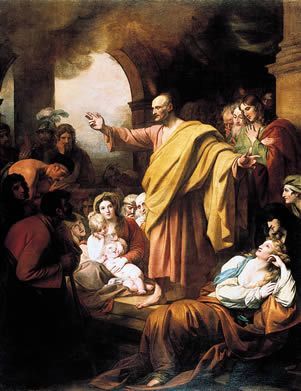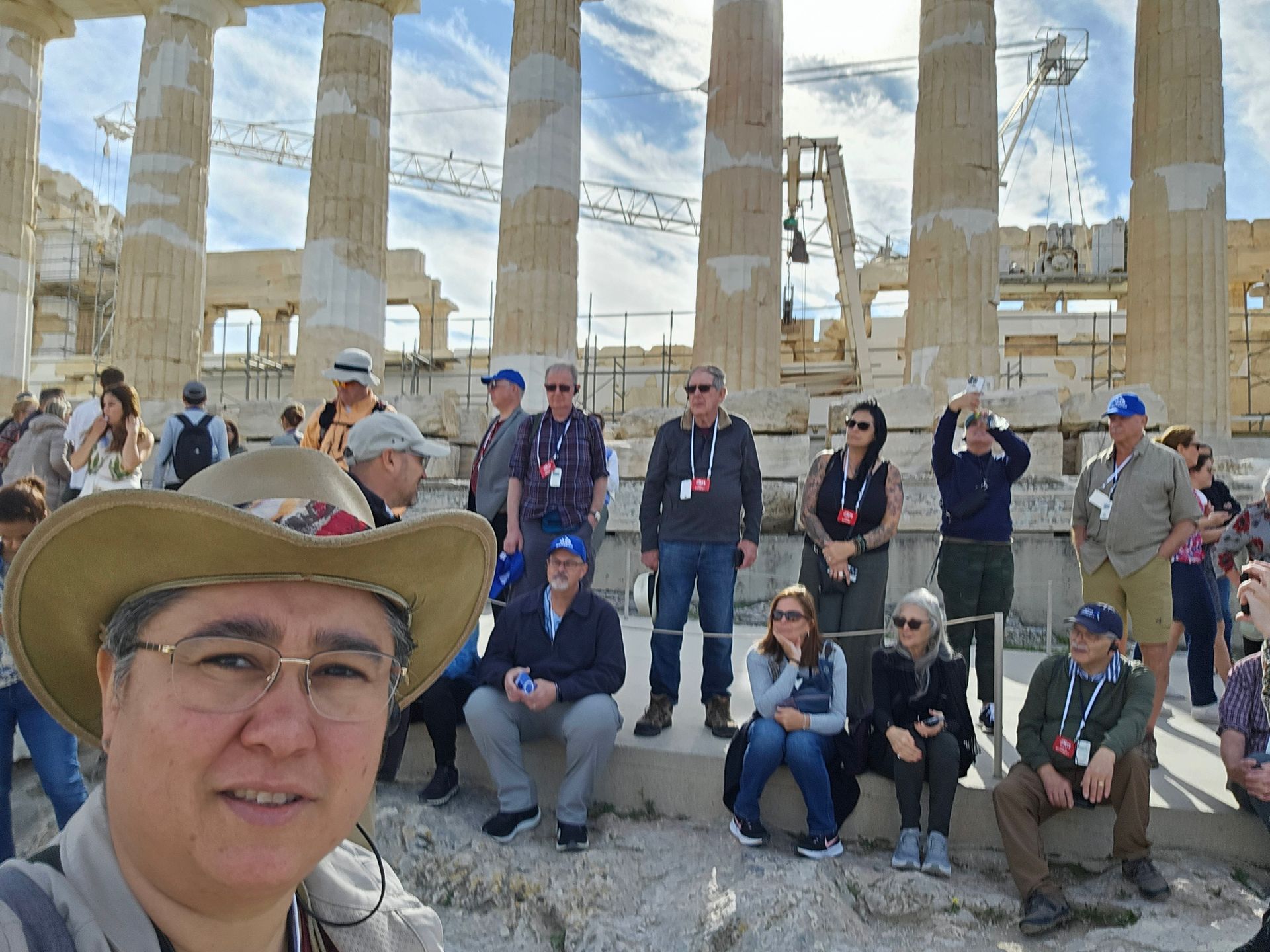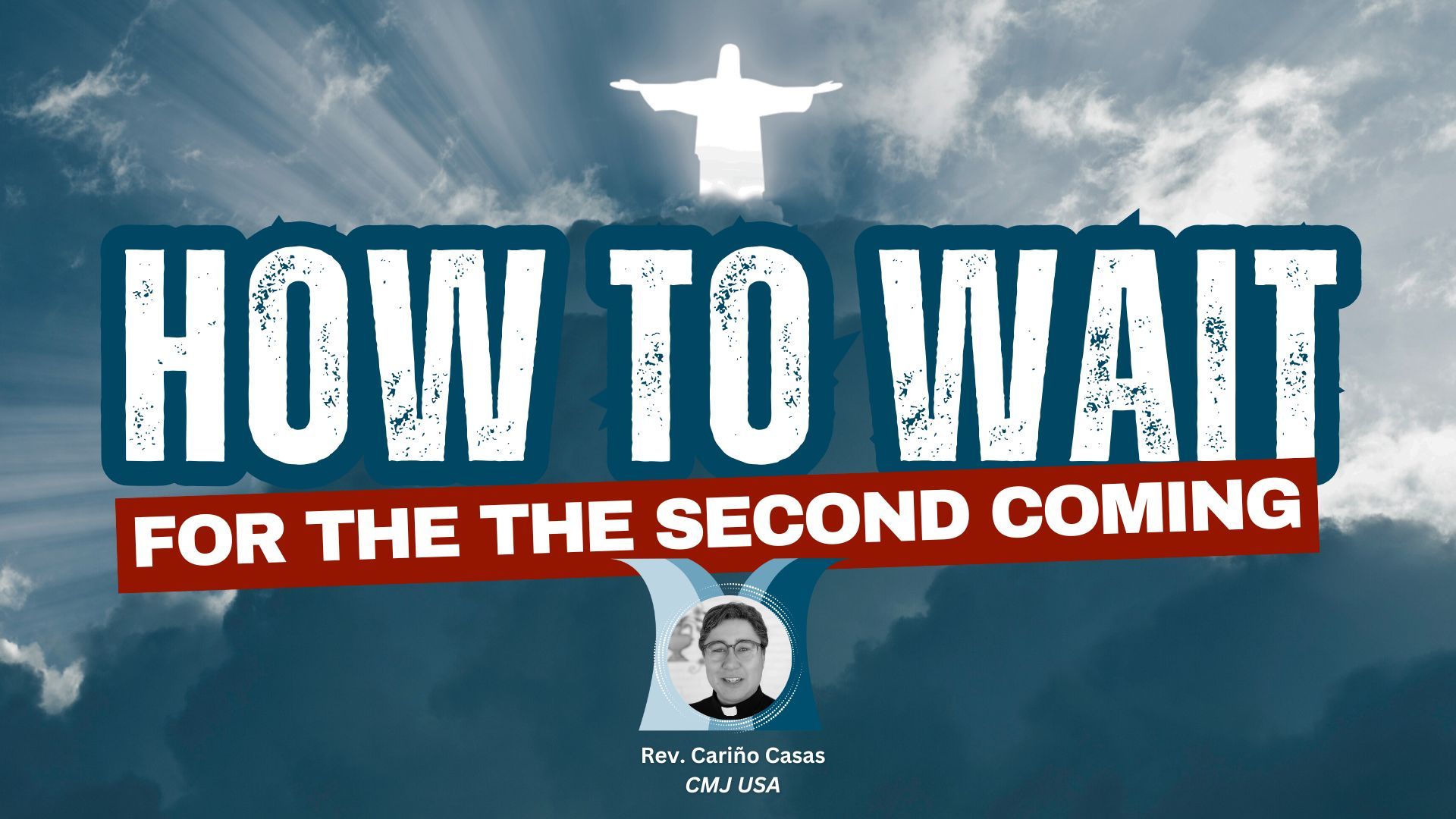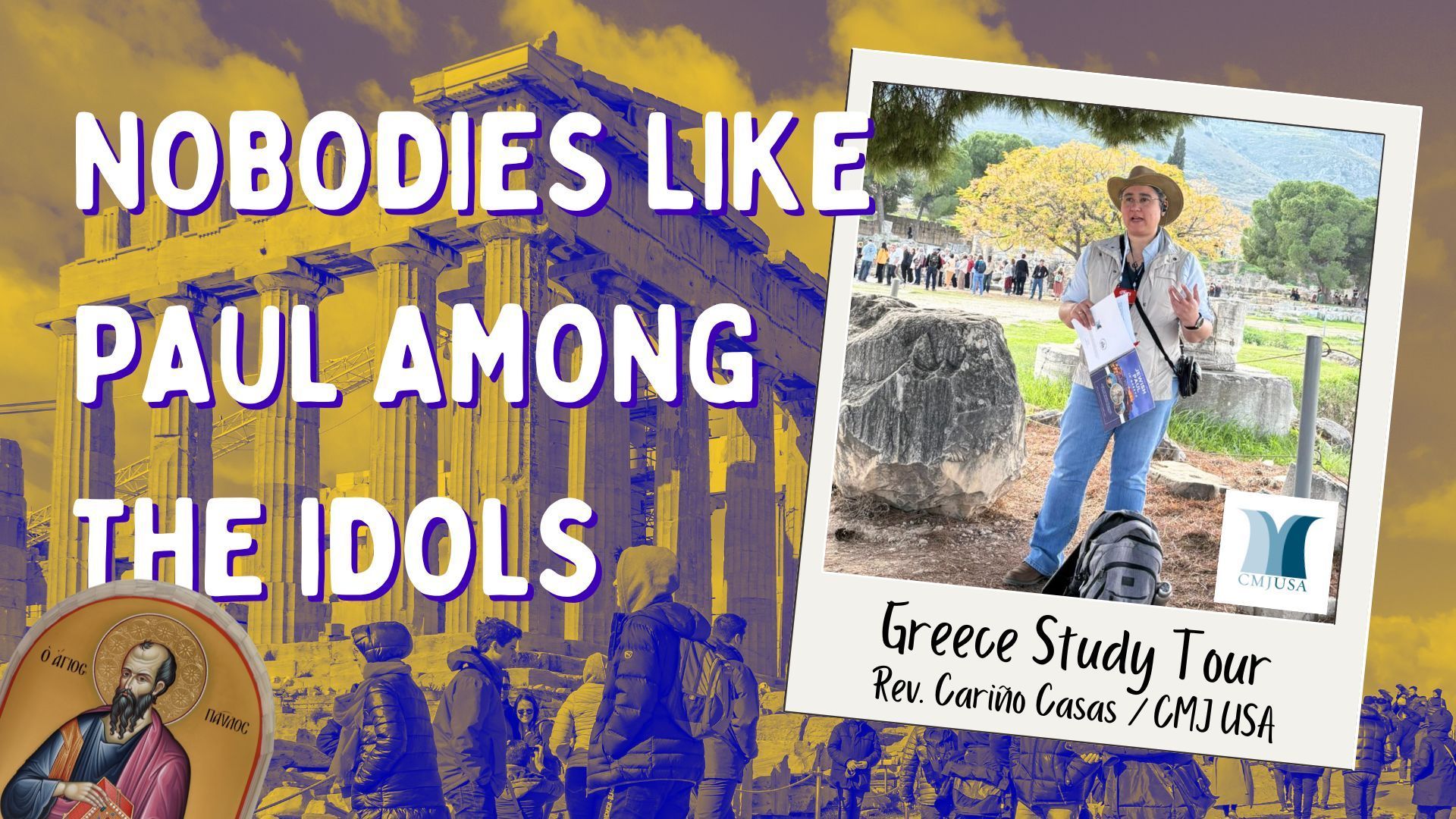Editor's note: This teaching is based on the sermon above, given at Christ Our Hope Anglican Church in Natrona Heights, PA.
Invite CMJ USA to your church or conference.
Today we will look at Peter’s sermon in Acts 3. This sermon, given inside the Jerusalem temple, can be summed up in what we call the mystery of our faith: Messiah has died. Messiah is risen. Messiah will come again.
As director of CMJ USA, my job is to remind you that Jesus and his Gospel message are Jewish and that we should contemplate what that means for us Gentiles who follow Jesus.
We’ll see that:
- Jesus is the Redeemer and Prophet that God promises to Israel,
- we must guard against antisemitic readings by always reading the New Testament from within Judaism,
- the Jewish context of the Gospel and the Jewish identity of Jesus must stir in us love and compassion for our Jewish neighbor.
Let’s set the scene of Acts 3. It’s late May or early June in Jerusalem. As Peter preaches, he expects the people to know what happened to Jesus of Nazareth. It’s probably a few days, weeks at most, since the biblical Feast of Weeks (Lev 23), what we call Pentecost. This was one of the three mandated pilgrim festivals when Jewish men were supposed to travel to Jerusalem to worship in the temple. It is thought that the population of Jerusalem tripled in size during feast times. The city is probably still full of pilgrims.
Peter and John are heading into the temple to pray. It’s about 3 in the afternoon on a warm day.[1]
As they enter the temple complex, a lame beggar asks them for money.
…they stared straight at him; and Kefa (Peter) said, “Look at us!” The crippled man fixed his attention on them, expecting to receive something from them. Kefa said, “I don’t have silver, and I don’t have gold, but what I do have I give to you: in the name of the Messiah, Yeshua of Natzeret, walk!” And taking hold of him by his right hand, Kefa pulled him up. Instantly his feet and ankles became strong; so that he sprang up, stood a moment, and began walking. Then he entered the Temple court with them, walking and leaping and praising God! Everyone saw him walking and praising God. They recognized him as the same man who had formerly sat begging at the Beautiful Gate of the Temple, and they were utterly amazed and confounded at what had happened to him. (Acts 3:4-10 CJB)
Why has this caught the worshippers’ attention? Because healing the lame was a sign of the Messiah. The prophets speak of a time when the lame will walk and the blind will see and the captives will be freed. These were the signs Jesus was constantly doing in his ministry. But most of the city thinks Jesus is dead. It’s been maybe two months since Passover and that wannabe messiah Jesus was crucified. Another disappointment.
But suddenly, a man everybody knows has been lame from birth is walking and leaping and praising God!
In
Acts 3:13, Peter says God, by healing the lame man, is glorifying “his servant Jesus.” When we see Jesus called God’s Servant, we mustn’t just read over it as some arbitrary selection from a thesaurus.
No, this is a deliberate word choice: servant. It is a reference to the Servant of God in Isaiah. Peter later unpacks this thought in his first letter when he quotes Isaiah 53:
21…the Messiah suffered, on your behalf, leaving an example so that you should follow in his steps.
22 “He committed no sin, nor was any deceit found on his lips.”
23 When he was insulted, he didn’t retaliate with insults; when he suffered, he didn’t threaten, but handed them over to him who judges justly.
24 He himself bore our sins in his body on the cross, so that we might die to sins and live for righteousness — by his wounds you were healed.
25 For you used to be like sheep gone astray, but now you have turned to the Shepherd, who watches over you (1 Peter 2:21-25).
When Peter says Jesus is God’s servant, he means the Suffering Servant of Isaiah 53 who dies for the sins of Israel and the nations.
As Peter continues preaching, he does not pull any punches as he tells the story of Jesus:
14 [God’s] servant Jesus, whom you delivered over and denied in the presence of Pilate, when he had decided to release him.
14 But you denied the Holy and Righteous One, and asked for a murderer to be granted to you,
15 and you killed the Author of life, whom God raised from the dead. To this we are witnesses. (Acts 3:14-15)
This passage and others like it have been mishandled throughout church history. Let’s pause to understand how and then tread carefully as we unpack Peter’s message.
There is an ancient line of theological thinking – that still persists in some corners of Christianity – that reads the crucifixion accounts and concludes, “The Jews killed Jesus. Jesus is God. The Jews killed God.” When these biblically obtuse Christians say “the Jews” they mean all Jews for all time. Sound silly?
In Steven Speilberg’s semi-autobiographical film
The Fabelmans, the director depicts several antisemitic incidents suffered by a boy named Sammy Fabelman. The bully jocks call out Sammy’s Jewishness in the locker room. They mock his name and call him Bagelman. They hang a bagel labeled “Jew Hole” in his locker. The abuse escalates when one boy calls him “Christ killer” and demands Sammy apologize for “killing our Lord.” Sammy explains that he wasn’t alive 2,000 years ago. The bullies then proceed to beat their Jewish classmate until he’s curled up on the concrete with a bloody nose. This is not something out of Spielberg’s imagination but likely something that happened to him or someone he knew.
Where does this vitriol stem from? Some of it can be blamed on church father John Chrysostom. In the fourth century, he preached eight sermons against followers of Jesus who continued to celebrate Easter at the same time as Passover and who would sometimes go to synagogue to celebrate the biblical feasts.
In the first of his sermons Against the Jews, Chrysostom says,
Tell me this. If a man were to have slain your son, would you endure to look upon him, or accept his greeting? Would you not shun him as a wicked demon, as the devil himself? They slew the Son of your Lord; do you have the boldness to enter with them under the same roof? After he was slain he heaped such honor upon you that he made you his brother and coheir. But you dishonor him so much that you pay honor to those who slew him on the cross, that you observe with them the fellowship of the festivals, that you go to their profane places, enter their unclean doors, and share in the tables of demons. For I am persuaded to call the fasting of the Jews a table of demons because they slew God.[3]
Yikes! Three centuries after Jesus died and rose again in Jerusalem, Chrysostom held the Jews of Antioch, 300 miles and 300 years removed, responsible for killing Jesus. How wrong is that?
Still, some sections of the church have read Chrysostom uncritically and continue to accept his take on the culpability of all Jews for all time. They have missed that God says, “The soul who sins shall die. The son shall not suffer for the iniquity of the father, nor the father suffer for the iniquity of the son. The righteousness of the righteous shall be upon himself, and the wickedness of the wicked shall be upon himself.” (Ezek 18:20)
They – we – also forget that in the Gospels and especially in the first chapters of Acts, nearly every interaction, conversation, and teaching happens between Jewish people. In Acts 3 Peter, a Galilean Jew, is preaching to pious Jews – likely from all over the world – who are in the temple to pray.
To avoid reading passages such as these antisemitically, we must consciously read them from within their Jewish context.
Peter’s harsh words –
- you delivered [Jesus] over and denied him before Pilate
- you denied the Holy and Righteous One and asked for a murderer instead
- you killed the Author of life
are one reason I believe this sermon was given within days or a few weeks of his Pentecost/Shavuot sermon, when the Holy Spirit was poured out and 3,000 were baptized. Peter expects his listeners to not only remember but to have been present that Passover Eve two months before when Jesus was crucified.
They say that preachers are to afflict the comfortable and to comfort the afflicted. Peter has afflicted these Jewish worshipers by calling out their part in Jesus’ death. But then he quickly offers comfort:
- “I know that you acted in ignorance, as did also your rulers.”
- This Jesus has “God raised from the dead. To this we are witnesses.”
When Peter says, “you did not understand” (CJB), I hear Jesus say from the cross, “Father, forgive them for they know not what they do.”
Does the Father hear the Son praying? Does he give Jesus the desires of his heart? I hope so because the Scriptures say that the resurrected Jesus sits at the right hand of the Father ever interceding for us! I’m counting on the Father’s mercy for me for the sake of his Son! So certainly, God forgave those responsible for executing Jesus.
Back to Peter’s sermon,
Acts 3:18:
“But what God foretold by the mouth of all the prophets, that his Christ would suffer, he thus fulfilled.”
Here are some of the big prophecies Peter is alluding to:
- Genesis 3: Jesus is the seed of the woman who is fatally bitten by the serpent as he crushes its head.
- Genesis 22: Like Abraham offered Isaac to God, so God offers his Son for the sake of the Sons of Abraham.
- Genesis 37-43: Jesus, like Joseph, was betrayed and sold by his brothers, was thought dead, and “returns to life” to save the family.
- Psalm 22: Jesus, Son of David, cries out “My God, my God, why have you forsaken me” when his hands and feet are pierced.
- Isaiah 52-53: The Servant of God is considered a sinner, is beaten for the healing of his people, and killed to cover the sin Israel and all the nations.
After Peter lays this out, he has a good, old-fashioned Baptist altar call:
19 Repent therefore, and turn back, that your sins may be blotted out,
20 that times of refreshing may come from the presence of the Lord, and that he may send the Christ appointed for you, Jesus,
21 whom heaven must receive until the time for restoring all the things about which God spoke by the mouth of his holy prophets long ago. (Acts 3:19-21)
Actually, it’s a very Jewish call to repentance. He gives three reasons for them to repent:
- “That your sins may be blotted out.” That’s Yom Kippur language. To this day, when Jews fast on the Day of Atonement, it is so that their sins will be blotted out from God’s record books.
- Repent, “that times of refreshing may come from the presence of the Lord.” One Messianic Jewish commentator says the times of refreshing refers to the Messianic Age when God’s king brings peace to all the earth. In the Mishna, an early Jewish commentary, there is a similar reference to the refreshing or cooling of one’s spirit in the world to come.[4]
- Repent, “that he may send the Messiah appointed for you, Yeshua.” Jesus ties his return and the start of the Messianic Age to the preaching of his gospel of repentance to all the nations of the world (Matt 24:14). Here Peter also ties repentance to Jesus’ return. Jesus ascended to the right hand of the Father maybe a month before, but Peter is already preaching Jesus’ return to his fellow Jews.
Is there a link between Jesus’ return and his Jewish brothers recognizing him as Messiah? When Jesus lamented over Jerusalem, he said, “You will not see me again, until you say, ‘Blessed is he who comes in the name of the Lord’” (Matt 23:39;
Luke 13:35).
To this day, in Hebrew, this is how you welcome someone when they come to your house.
Baruch haba b’shem Adonai.
Blessed is he who comes in the name of the Lord. Jesus said Jerusalem will not see him again until they welcome him home, until they call for him to come (Zech 12:10).
How then will they call on him in whom they have not believed? And how are they to believe in him of whom they have never heard? And how are they to hear without someone preaching? And how are they to preach unless they are sent? As it is written, “How beautiful are the feet of those who preach the good news!” (Rom 10:14-15)
There’s more to Peter’s sermon that we won’t tackle here, like Jesus as the Prophet Like Moses and God calling Abraham to bless all the nations who rebelled at Babel.
The takeaway today, Christian, is that this story we step into when we believe on the name of our Lord Jesus Messiah and are saved is a Jewish one. We are disciples of the Jewish Rabbi Jesus. We worship the God of Abraham, Isaac, and Jacob.
What we celebrate every Sunday was foretold by Moses, Samuel, David, Ezekiel, Isaiah, Zechariah, and all the rest. When we get to Pentecost and remember the outpouring of the Holy Spirit, we are celebrating the fulfillment of a prophecy by the Israelite prophet Joel on a feast day prescribed in Leviticus.
Why can’t our Jewish neighbors see the fullness of who Jesus is? Only God knows really.
The story of Joseph, though, gives us hope. I mentioned before that in the Genesis account of Joseph, his brothers didn’t recognize him when he was dressed like an Egyptian ruler. Many Jews are content to say that Jesus is the Messiah for the Gentiles but they can’t recognize him as Jewish under hundreds of years of “Christian” garb.
What matters for us is how we will react and interact with our Jewish neighbors who say Jesus isn’t for them. Will we demonize them like Chrysostom, the Spanish Inquisition, and Martin Luther?[5]
Will we demonize them or will we love them sacrificially as Jesus calls us to?
Will we hold the sins of Israel’s government against all Jews or can we intercede for Israel like Jesus and say, “Father, forgive them for they know not what they do.”
Jesus of Nazareth is the Prophet Like Moses, the Suffering Servant of God, the Author of Life. He was killed by sinful but ignorant humans – Jewish and Gentile. But he rose from the dead having atoned for our sins, the sins of our neighbors and to redeem us all – Jew and Gentile.
Let us receive our forgiveness and restoration and then invite others to repent and enter the new life offered by Jesus’ nail-scarred hands.
Footnotes
[1] During the Babylonian exile, the sacrifice times had been converted into prayer times. When the temple was rebuilt, those prayer times were kept and integrated into temple worship. Even today, you will see observant Jews arrive at the Western Wall to pray at the morning, afternoon, and evening prayer times. We Christians inherit this practice of stopping to pray throughout the day through the daily office. So much of the Book of Common Prayer takes inspiration from the Jewish siddur (prayer book).
[2] David H. Stern, Jewish New Testament Commentary : A Companion Volume to the Jewish New Testament, electronic ed. (Clarksville: Jewish New Testament Publications, 1996),
Ac 3:13.
[3] John Chrysostom, Against the Jews, Homily 1. Tertullian.org. Accessed 6 Apr 2024.
https://www.tertullian.org/fathers/chrysostom_adversus_judaeos_01_homily1.htm
[4] Avot 4:17 as quoted in Stern,
Ac 3:20. See also Hermann L. Strack and Paul Billerbeck, ed. and trans. Jacob N. Cerone, A Commentary on the New Testament from the Talmud & Midrash (Bellingham, WA: Lexham Press, 2022), 721.
[5] Yes, Martin Luther was a raging antisemite at the end of his life. He called for synagogues to be burned among many other horrific things. Martin Luther, On the Jews and Their Lies, 1543.




